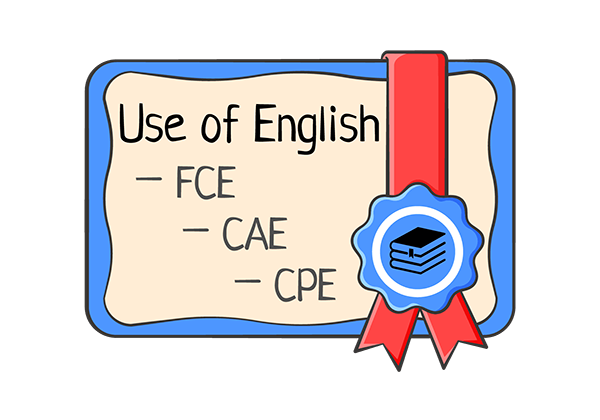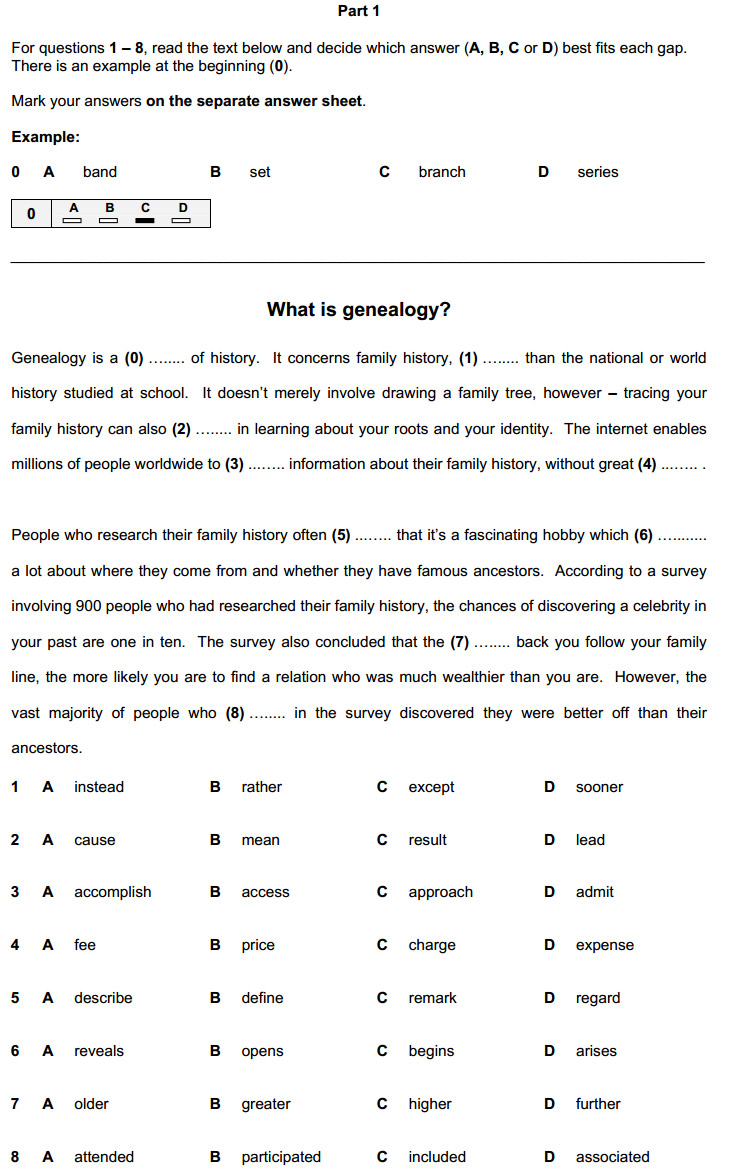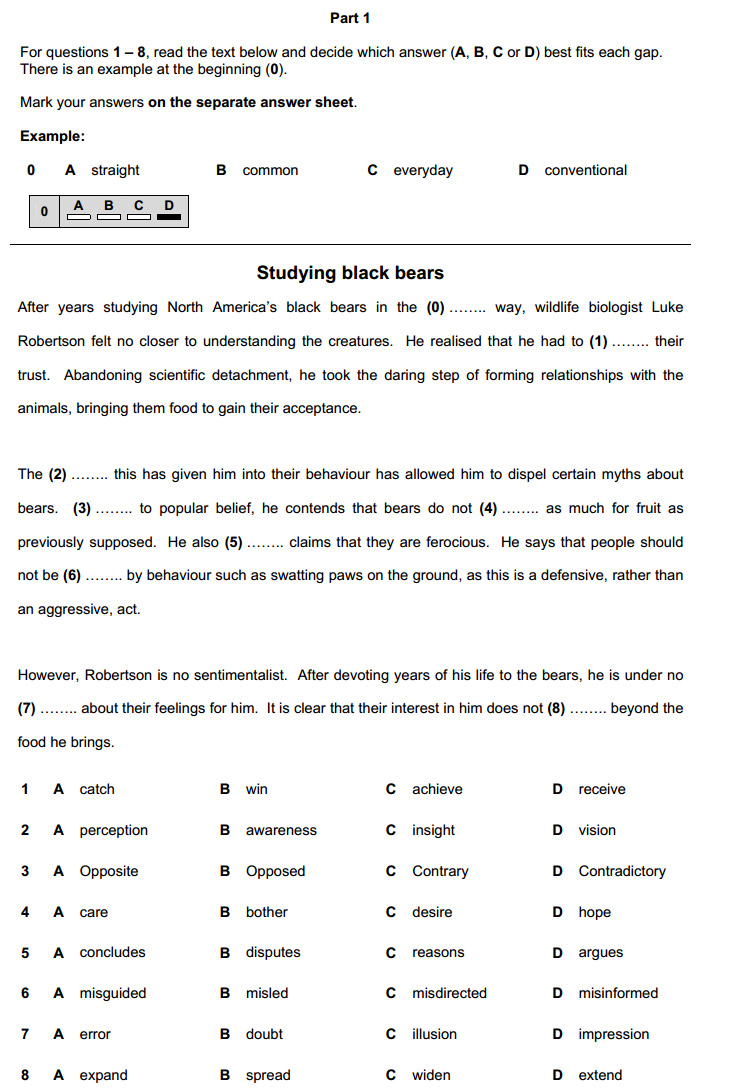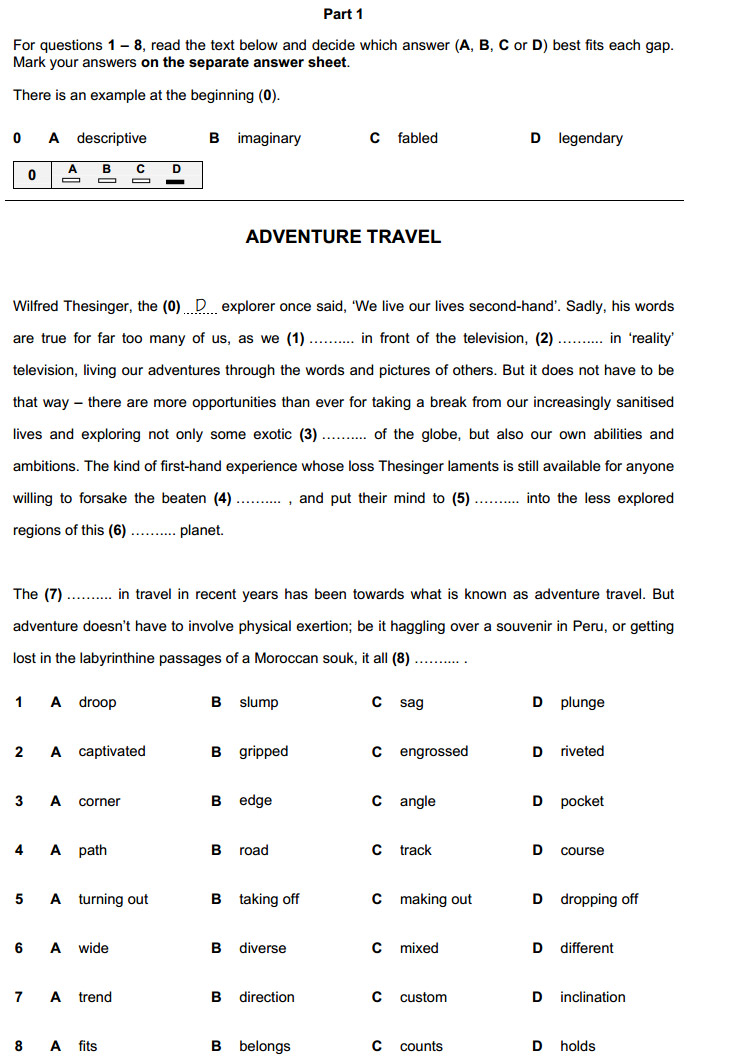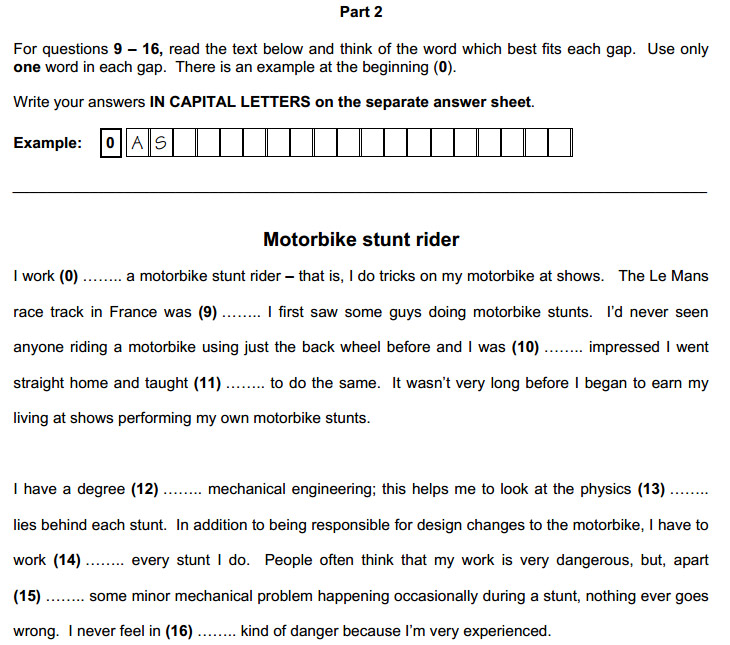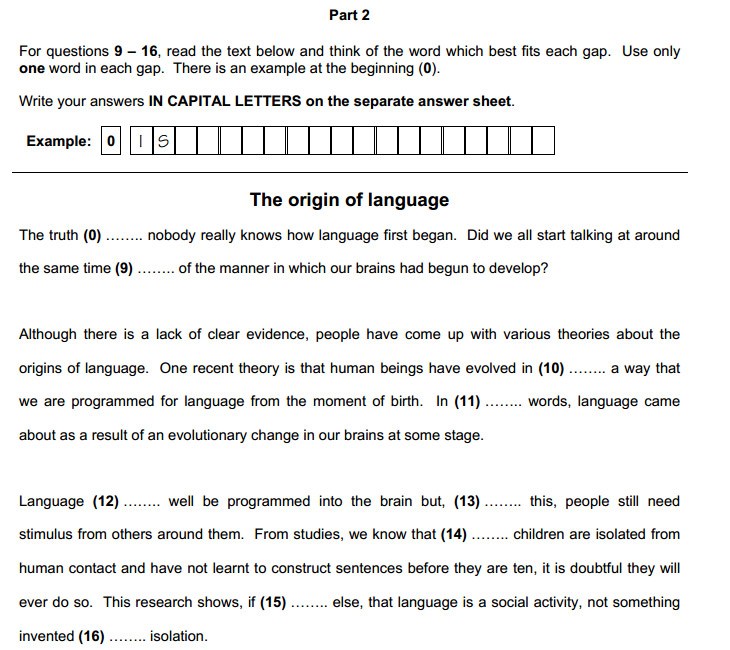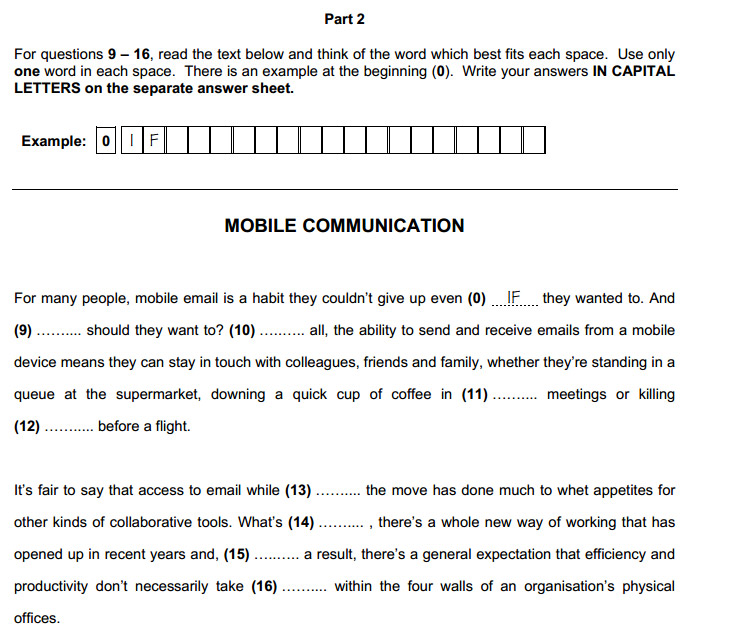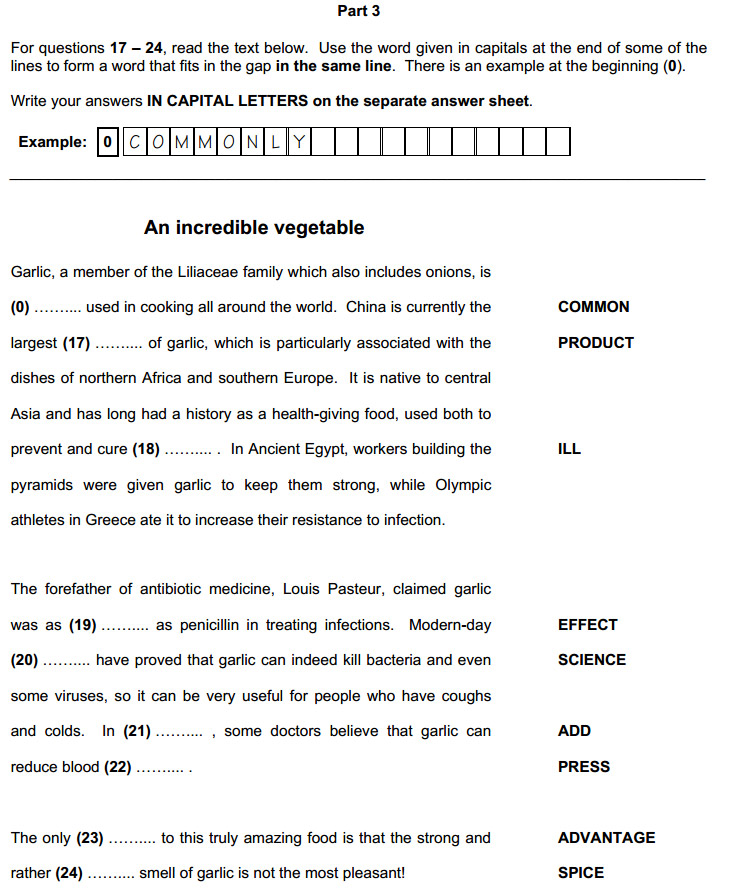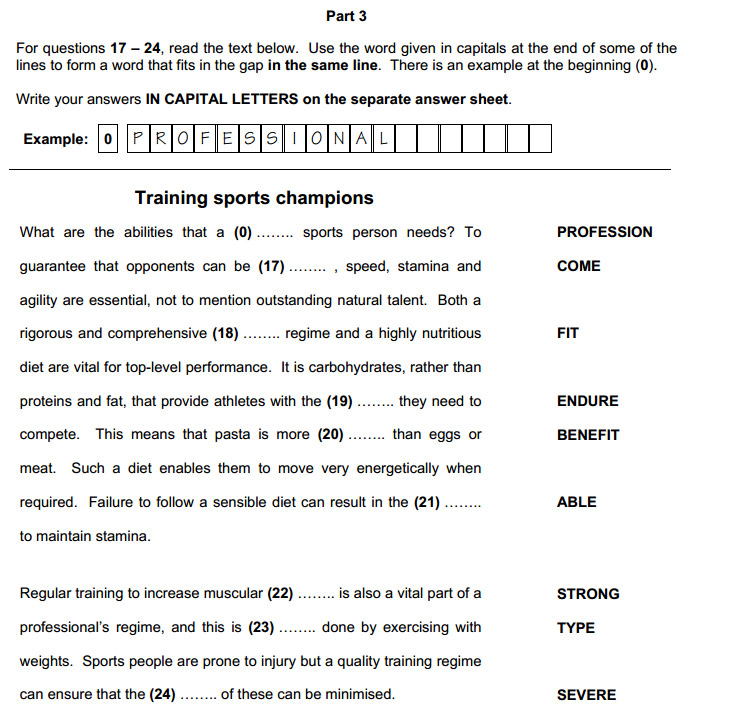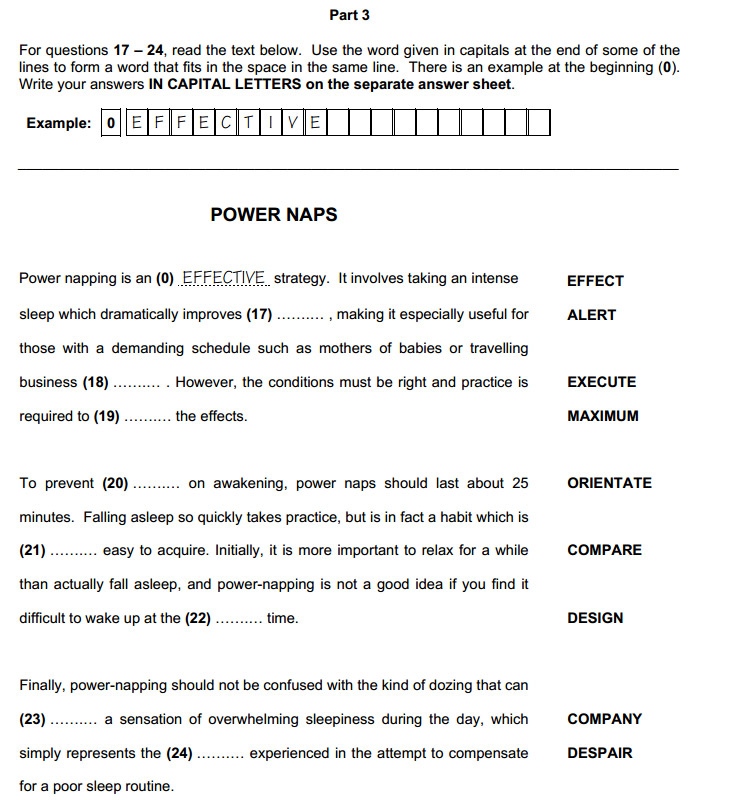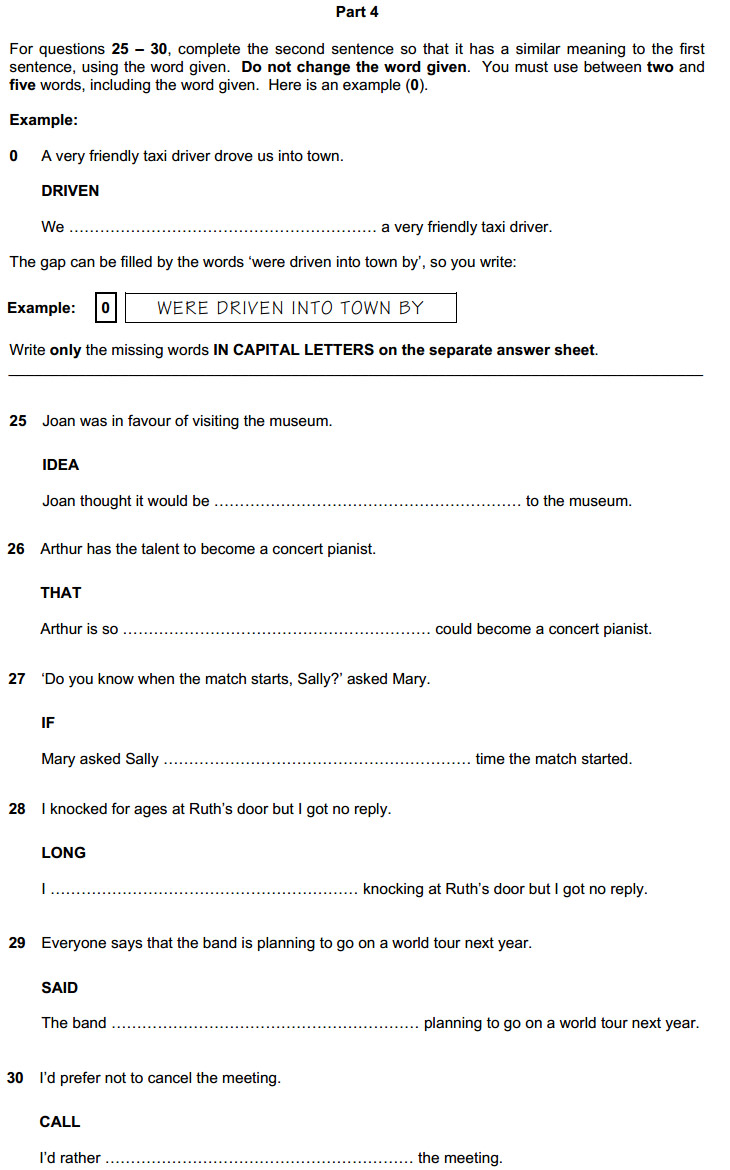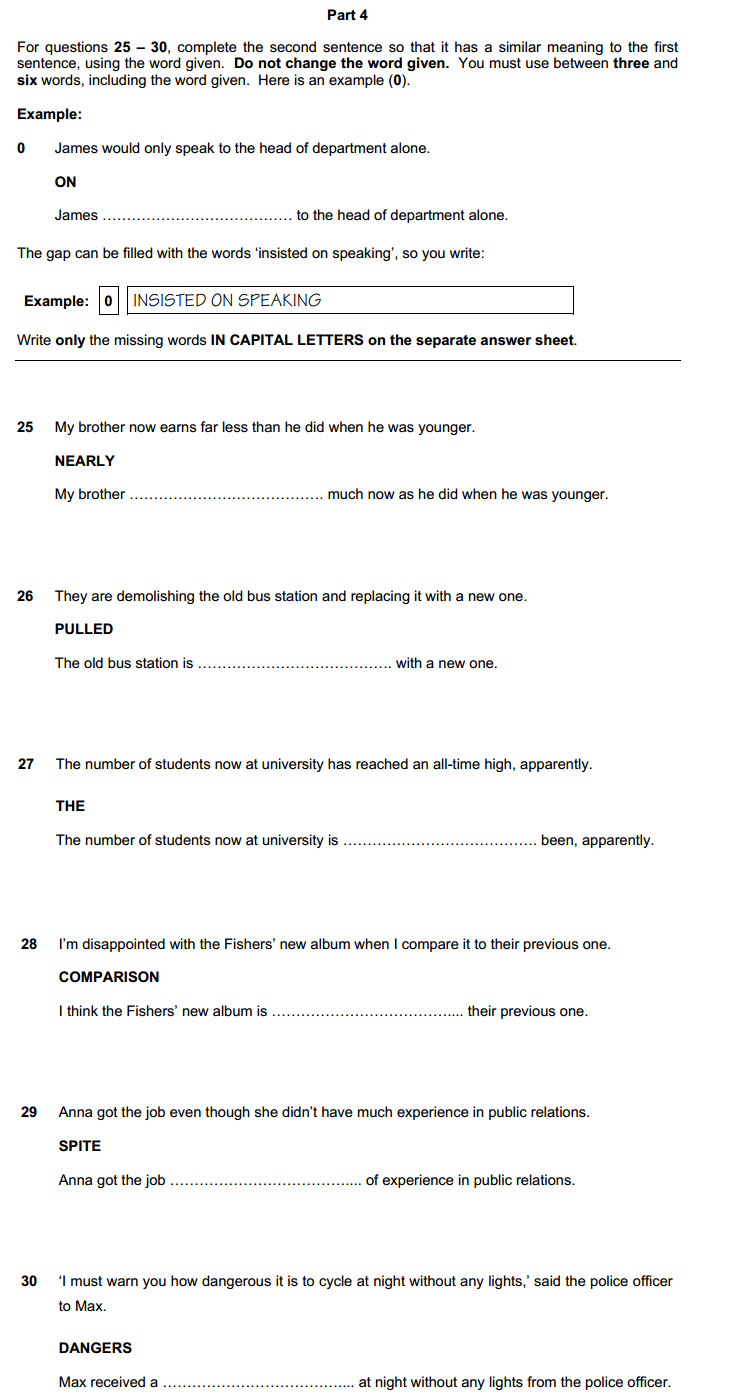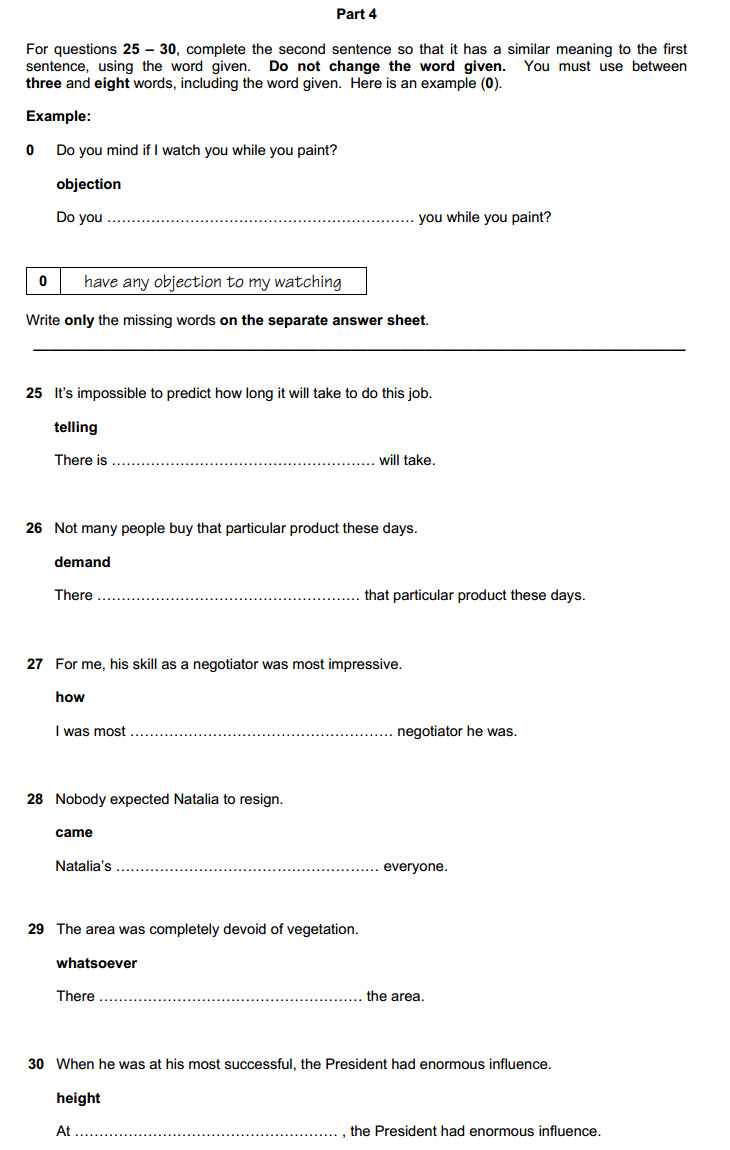-
Task Type: Key Word Transformations
-
Focus: Lexical and grammatical
-
-
Format: Six separate items, each with a lead-in sentence and a gapped second
sentence to be completed in two to five words, one of which is a given
‘key word’
-
-
Number of questions: 6
-
How many marks are there: Up to two marks for each correct answer
What is testing:
- modal verbs and semi-modal verbы
- phrasal verbs
- verb patterns
- direct speach to reported speach
- active voice to passive voice
- linking words/do and make/idioms/conditionals/unreal past
General Advice
- Write between two and five words as your answer
- Contractions like can’t or mustn’t are counted as two words
- Take a guess if necessary! You will not loose marks
- Remember that you cannot change the key word
cambridge english first certificate (fce) test
Key Word Transformations
- FCE : Key Word Transformations 1
- FCE : Key Word Transformations 2
- FCE : Key Word Transformations 3
- FCE : Key Word Transformations 4
- FCE : Key Word Transformations 5
- FCE : Key Word Transformations 6
- FCE : Key Word Transformations 7
- FCE : Key Word Transformations 8
- FCE : Key Word Transformations 9
- FCE : Key Word Transformations 10
- FCE : Key Word Transformations 11
- FCE : Key Word Transformations 12
- FCE : Key Word Transformations 13
- FCE : Key Word Transformations 14
- FCE : Key Word Transformations 15
- FCE : Key Word Transformations 16
- FCE : Key Word Transformations 17
- FCE : Key Word Transformations 18
- FCE : Key Word Transformations 19
- FCE : Key Word Transformations 20
by Adam Skimins 7th March 2022
- Article navigation:
- 40 Key Word Transformation: Exercises
- C1 Advanced (CAE) Use of English Part 4: Tips & Strategy
The important thing in key word transformations is that you keep the meaning the same – EXACTLY the same. So it’s important that you read through the first sentence and your second sentence to ensure you have kept the meaning the same.
Look at the key word. What type of word is it? What usually follows it, e.g. an infinitive, a preposition, or could it be part of a phrasal verb?
- Think about the other words that need to change in the new word order, e.g. an adjective may become a noun or vice versa.
- Your answer may include words or expressions not used in the first sentence, but these must express exactly the same idea.
- Remember that contracted words count as two words, e.g. won’t = will not.
Because of the scoring system, it’s possible to get 50% in this section without getting any of the questions 100% correct. So it’s worth answering every question! Even incomplete answers can get points
post sponsored by: Zintego
40 Key Word Transformation: Exercises
Complete the sentence so that it has a similar meaning. Do not change the word given. You must use between two and six words, including the word given.
Brian was really interested in North American history in his school days.
Brian had an interest in (INTEREST) North American history in his school days.
Darius soon recovered after the operation on his knee and was able to rejoin the team.
After the operation on his knee, Darius (MADE) and was able to rejoin the team.
made a fast recovery
You must include the word given (MADE)You must use beetwen 3 and 6 words.
I always hated pasta when I was a child but now I cook it regularly.
I (USE) pasta when I was a child but now I cook it regularly.
didn’t use to likedid not use to like
You must include the word given (USE)You must use beetwen 3 and 6 words.
It was a mistake not to write the telephone number down.
I should (POINT) writing down the telephone number.
have made a point of
You must include the word given (POINT)You must use beetwen 3 and 6 words.
If Marc hadn´t taken up politics, he might have become a famous art historian.
If Marc hadn’t taken up politics, he might have (NAME) himself as an art historian.
made a name for
You must include the word given (NAME)You must use beetwen 3 and 6 words.
This holiday is withing our price range, provided we don’t go to the expensive restaurants in the tourist centre.
We (AFFORD) as we avoid the expensive restaurants in the tourist centre.
can afford this holiday as long
You must include the word given (AFFORD)You must use beetwen 3 and 6 words.
Yesterday I informed my boss in writing that I would be leaving the company.
I (NOTICE) to my boss yesterday.
handed in my notice
You must include the word given (NOTICE)You must use beetwen 3 and 6 words.
Complete the sentence so that it has a similar meaning. Do not change the word given. You must use between two and six words, including the word given.
Brian was really interested in North American history in his school days.
Brian had an interest in (INTEREST) North American history in his school days.
It’s very unlikely that martin will win the 100 metres, as he’s out of training.
Martin has almost (CHANCE) the 100 metres, as he’s out of training.
no chance of winning
You must include the word given (CHANCE)You must use beetwen 3 and 6 words.
Most of the children ignored what the teacher had told them.
Few of the children (NOTICE) what the teacher had told them.
took notice of
You must include the word given (NOTICE)You must use beetwen 3 and 6 words.
The company is unable to guarantee an allocated car-parking space to all employees.
The company’s employees shouldn´t (COUNT) allocated a car-parking space.
count on being
You must include the word given (COUNT)You must use beetwen 3 and 6 words.
He no longer thinks he can find a job before the end of the year.
He has given (HOPE) a job before the end of the year.
up hope of finding
You must include the word given (HOPE)You must use beetwen 3 and 6 words.
I’m sure Jemma is going to become a famous model one day.
I think it’s only (MATTER) Jemma becomes a famous model.
a matter of time before
You must include the word given (MATTER)You must use beetwen 3 and 6 words.
I think learning to use a typewriter is a waste of time.
I can´t (POINT) how to use a typewriter.
see the point in learningsee the point of learning
You must include the word given (POINT)You must use beetwen 3 and 6 words.
Complete the sentence so that it has a similar meaning. Do not change the word given. You must use between two and six words, including the word given.
Brian was really interested in North American history in his school days.
Brian had an interest in (INTEREST) North American history in his school days.
The company has a good reputation in the local area.
The company (HIGHLY) of in the local area.
is highly spoken
You must include the word given (HIGHLY)You must use beetwen 3 and 6 words.
Nadia’s friend arrived just as she was about to leave the restaurant.
Nadia was (POINT) the restaurant when her friend arrived.
on the point of leaving
You must include the word given (POINT)You must use beetwen 3 and 6 words.
I don’t expect the company to make a profit this year, given the economic climate.
Given the economic climate, (SURPRISED) the company made a profit this year.
i would be surprised if
You must include the word given (SURPRISED)You must use beetwen 3 and 6 words.
Barbara´s parents were certain that she would be a great tennis player.
Barbara’s parents were (DOUBT) that she would be a great tennis player.
in no doubt
You must include the word given (DOUBT)You must use beetwen 3 and 6 words.
My grandfather had completely forgotten that he phoned me last night.
My grandfather didn’t (RECOLLECTION) phoning me last night.
have any recollection of
You must include the word given (RECOLLECTION)You must use beetwen 3 and 6 words.
Pay claims must be submitted before the end of the month.
You have (PUT) your pay claims before the end of the month.
to put in
You must include the word given (PUT)You must use beetwen 3 and 6 words.
Complete the sentence so that it has a similar meaning. Do not change the word given. You must use between two and six words, including the word given.
Brian was really interested in North American history in his school days.
Brian had an interest in (INTEREST) North American history in his school days.
Given that he has no experience, will Glyn be able to do this job?
Will Glyn’s (AFFECT) ability to do this job?
lack of experience affect his
You must include the word given (AFFECT)You must use beetwen 3 and 6 words.
At no time did we think that Pedro might be planning to leave the country.
It (OCCURED) that Pedro might be planning to leave the country.
never occured to ushad never occured to us
You must include the word given (OCCURED)You must use beetwen 3 and 6 words.
I’m sure we went the wrong way at the last junction.
We must (TAKEN) at the junction.
have taken the wrong turninghave taken the wrong turn
You must include the word given (TAKEN)You must use beetwen 3 and 6 words.
We wanted to continue our mountain trek but the weather was too bad.
We (LIKE) on with our mountain trek but the weather was too bad.
would like to have carriedwould have liked to carry
You must include the word given (LIKE)You must use beetwen 3 and 6 words.
No changes will be made to this project.
This project will (AHEAD) to plan.
go ahead according
You must include the word given (AHEAD)You must use beetwen 3 and 6 words.
Simon really ought to make a decision about his future.
It’s high time Simon (MIND) about his future.
made up his mind
You must include the word given (MIND)You must use beetwen 3 and 6 words.
Complete the sentence so that it has a similar meaning. Do not change the word given. You must use between two and six words, including the word given.
Brian was really interested in North American history in his school days.
Brian had an interest in (INTEREST) North American history in his school days.
Phoebe was surprised to be offered a place on the course.
The offer of a place on the course (CAME) Phoebe.
came as a surprise to
You must include the word given (CAME)You must use beetwen 3 and 6 words.
I can´t deny that I was embarrassed to be given the award.
There’s (NO) embarrassment at being given the award.
no denying my
You must include the word given (NO)You must use beetwen 3 and 6 words.
I think Anita must have gone on a diet recently because she’s quite slim now.
It looks as (HAS) dieting because she’s quite slim now.
if anita has been
You must include the word given (HAS)You must use beetwen 3 and 6 words.
Delia said that she would no longer tolerate her colleagues being rude.
‘I am not willing (PUT) from my colleagues any longer, ‘ said Delia.
to put up with any rudeness
You must include the word given (PUT)You must use beetwen 3 and 6 words.
It’s difficult to know what my reaction would have been in that situation.
I’m not (HOW) in that situation.
sure how i would have reacted
You must include the word given (HOW)You must use beetwen 3 and 6 words.
Do you mind if I come over to see you later?
Do you (OBJECTION) coming over to see you later?
have any objection to me
You must include the word given (OBJECTION)You must use beetwen 3 and 6 words.
Would you pass C1 Advanced (CAE)?
Sign up, resolve the tests and see what results you get.
Sign up
C1 Advanced (CAE) Use of English Part 4: Tips & Strategy
C1 Advanced (CAE) Use of English: Part 4 question type here is called key word transformation.
You have to complete the second sentence, using the key word.
Strategy
- Read the sentence carefully and think about its exact meaning.
- Check your tenses – if the first sentence is in the past tense, the second should be, too!
- Contractions (e.g. haven’t) count as two words.
- Try to keep the same meaning – If the first sentence says ‘Tom said…’ then don’t write ‘He said…’ in the second sentence. (Write ‘Tom said’.)
- Write between two and six words, including the word given.
Tips
Find things that are the same in both sentences and delete them. That helps you to focus on what you actually need to be transforming.
Make absolutely sure that the two sentences mean the same thing. For example, if the sentence to transform has names in it, the answer will have to have them too.
Would you pass C1 Advanced (CAE)?
Sign up, resolve the tests and see what results you get.
Sign up
Procedure:
Part I. Presentation — the theory of Key Word Transformation and instructions
Step 1. Students read and analyze the lead-in sentence.
Step 2. Students examine the key word. Remember that it must not be transformed.
Step 3. Students define what kind of transformation will be suitable in the sentence.
Step 4. Students write a new construction.
Step 5. Students read the net sentence to check if it makes sense.
Step 6. Students write the answer in the exam paper. Remember that the only transformed words must be written as an answer.
Part II. Practice
Exercise 1.
1. Unless you leave now, you’ll miss the train.
IF
You’ll miss the train _____________ now.
2. Give me your address, as I might visit Barcelona.
CASE
Give me your address _____________ visit Barcelona.
3. I always watch the late-night news on TV.
NEVER
I _______________ the late-night news on TV.
4. George didn’t get much sleep last night as usual.
HARDLY
Last night George _______________ as usual.
5. His parents were travelling in the desert so they couldn’t follow the news.
KEEP
His parents were travelling in the desert so they weren’t ________ the news.
Exercise 2.
1. Adam can’t wait to go snowboarding next week.
FORWARD
Adam-s really ____________ snowboarding next week.
2. What’s your uncle’s job?
FOR
What _______________ a living?
3. I’m sure Rafael Nadal earned a lot of for that car advertisement.
BEEN
Rafael Nadal ________ a lot for that car advertisement.
4. The candidate couldn’t register for the election because he missed the deadline.
ABLE
If the candidate hadn’t missed the deadline, he _______________ register for the election.
5. I was really impressed by the images in the advert.
MADE
The images in the advert really __________ me.
Part III. Product
A teacher asks students to compose their own tasks on the topic themselves.
В этой статье мы разберем структуру заданий одной из самых значимых частей кембриджских экзаменов Use of English (использование английского — грамматика и лексика) и поделимся советами по их успешному выполнению.
В блоге уже выходили статьи о том, как сдать Writing (письменную часть), Reading (чтение) и Listening (аудирование) на экзаменах FCE, CAE, CPE — советуем ознакомиться с этими материалами. Теперь перейдем к тому, как подготовиться к части Use of English экзаменов FCE, CAE, СPE.
Типы заданий в части Use of English
Раздел Use of English экзаменов FCE, CAE и CPE объединен с разделом Reading. На выполнение всей части Reading and Use of English вам дадут 1 час 15 минут на экзамене FCE и 1 час 30 минут на CAE и CPE. За это время вам надо выполнить порядка 7-8 заданий. Первые 4 задания относятся к части Use of English, которая проверяет ваш словарный запас и знание грамматики, а остальные — к части Reading.
Давайте посмотрим, из каких заданий состоит Use of English на кембриджских экзаменах:
| Экзамен | Multiple choice cloze | Open cloze | Word formation | Key word transformations |
|---|---|---|---|---|
| FCE, CAE, CPE | Part 1 8 предложений по 1 баллу |
Part 2 8 предложений по 1 баллу |
Part 3 8 предложений по 1 баллу |
Part 4 4-6 предложений по 2 балла |
Экзамены совпадают по структуре, баллам и количеству заданий, но отличаются по степени сложности. Разберем примеры заданий Кембриджских экзаменов с официального сайта: FCE, CAE и CPE.
Part 1: Multiple-choice cloze (выбрать правильный ответ из нескольких предложенных)
Суть задания: Вам нужно заполнить пропуски в тексте, выбрав одно из предложенных четырех слов. Всего пропущено 8 слов. В этом задании проверяется словарный запас (vocabulary) — знание фразовых глаголов, устойчивых выражений, идиом, оттенков значений и т. п.
Техника выполнения: Чтобы получить общее представление о тексте, прочитайте его, не обращая внимания на пропущенные слова. Далее внимательно читайте каждое предложение и варианты ответа. Исключите варианты, которые явно не подходят, затем из оставшихся выберите тот, который логически дополнит предложение и будет сочетаться с рядом стоящими словами. Рассмотрим пример:
They couldn’t (1)… a decision and agreed to meet again after lunch.
a) arrive
b) achieve
c) reach
d) attain
Хорошо зная устойчивые словосочетания, вы выберите вариант reach.
I like to go to the beach (2)… my wife likes to stay in and watch a TV show.
a) then
b) where
c) when
d) whereas
Однозначно не подходят варианты then (в примере указаны не последовательные действия, а параллельные) и where (нелогично, она в номере смотрит шоу, а не на пляже). Выбирая между when и whereas, следует предпочесть «в то время как», в значении противопоставления, а не просто «когда». Правильный ответ — whereas.
Пример задания multiple choice cloze на экзамене FCE
Пример задания multiple choice cloze на экзамене CAE
Пример задания multiple choice cloze на экзамене CPE
Part 2: Open cloze (вставить слово в предложение без вариантов ответа)
Суть задания: Нужно вновь заполнить пропуски в тексте словами, подходящими по смыслу. Пропущено 8 слов, но в этот раз вам не предлагают никаких вариантов.
Техника выполнения: Прочтите текст, не обращая внимания на пропущенные слова. Затем прочитайте внимательно каждое предложение. Обратите внимание, какие слова стоят до и после пропущенного слова. Они подскажут вам, к какой части речи относится это слово, число или время, в котором оно должно стоять. Например:
I really (1)… like this picture! It’s a masterpiece.
Очевидно, что предложение вполне самодостаточное и без вставки. Вместе с тем вы можете увидеть, что перед вами эмоциональное высказывание. Значит, правильно будет вспомнить про вспомогательный глагол do в функции усиления — I really do like this picture! It’s a masterpiece.
The concert has been cancelled (2)… to the epidemic situation in the city.
В первой части предложения — следствие, а во второй — причина. Мы не можем вставить because, так как после него употребляется предлог of, a не to. Необходимо рассмотреть другие варианты, близкие по значению к «потому что» и «из-за». Отлично подойдут owing и due. Иногда могут подходить сразу два варианта ответа, каждый из них будет правильным, но вам все равно нужно вписать один.
Пример задания open cloze на экзамене FCE
Пример задания open cloze на экзамене CAE
Пример задания open cloze на экзамене CPE
Part 3: Word formation (словообразование)
Суть задания: Вам нужно заполнить пропуски в тексте, образуя однокоренные слова от предложенных. Это задание проверяет насколько грамотно вы используете словарный запас.
Техника выполнения: Следует прочитать текст несколько раз — сначала бегло, а затем вдумчиво, обращая внимание на key words и слова, которые идут до и после него. Это поможет вам правильно определить часть речи производного слова. Большинство слов изменяются с помощью приставок, суффиксов и окончаний, например: courage – discourage, circle – circular, health – unhealthy, employ – unemployed. Переведите предложение, чтобы убедиться в правильности выбранной части речи.
Самые распространенные ошибки при выполнении этого задания:
- Путаница в отрицательных и положительных характеристиках
Don’t be so …, I’ll finish the task in a minute. (patience)
Если не обратить внимание на отрицание (don’t be) и использовать прилагательное patient (производное от patience), то это будет ошибкой. Правильный ответ — impatient.
Чтобы избежать ошибки, внимательно читайте весь текст и следите за логикой предложения.
- Неправильная часть речи
My boyfriend is not very … about the idea of going to New York. (enthusiasm)
Правильный ответ — прилагательное enthusiastic. Если использовать вместо него наречие enthusiastically, это будет ошибкой. Выбор наречия вместо прилагательного и наоборот — распространенная ошибка.
- Ошибки в выборе единственного или множественного числа
Tina’s husband is one of the strongest … in her business. (support)
Правильный ответ — supporters. Единственное число — supporter — будет ошибкой. Сбить может тот факт, что мы говорим об одном человеке, но ведь в предложении есть конструкция one of (один из).
- Орфографические ошибки
Чтобы избежать орфографических ошибок, необходимо регулярно практиковать правописание и не лениться проверять слова в словаре.
Пример задания word formation на экзамене FCE
Пример задания word formation на экзамене CAE
Пример задания word formation на экзамене CPE
Part 4: Key word transformations (перефразирование предложения с использованием ключевого слова)
Суть задания: Вам даны предложение и ключевое слово/словосочетание. Необходимо преобразовать предложение таким образом, чтобы в него вошло данное ключевое слово/словосочетание, учитывая ограничения по количеству слов, указанных в задании. Полученное предложение не должно отличаться по смыслу от исходного.
Техника выполнения: Прочитайте исходное предложение и вспомните все устойчивые выражения и фразы с указанным key word. Затем прочитайте второе предложение с пропуском. При трансформации предложения вы не должны выходить за рамки указанного количества слов в задании (с учетом key word). Конечно, нельзя изменять key word. Например, если дано wish, не стоит использовать wishes или wishing. Если дано not, нельзя вместо него использовать no. Также проверяйте, нет ли в вашем ответе лишних слов. Разберем пример:
I regret ever telling her about my private life. (wish)
I ____________________ her about my private life.
Правильный ответ — I wish I had not told her about my private life.
В приведенном примере местоимение her уже есть в предложении с пропуском. Если напишете wish I had not told her вместо wish I had not told, это будет ошибкой. За каждое верно перефразированное предложение вы получаете два балла, и один балл, если вы допустили небольшую ошибку.
Пример задания key word transformations на экзамене FCE
Пример задания key word transformations на экзамене CAE
Пример задания key word transformations на экзамене CPE
Хотите получить международный сертификат? Записывайтесь на курс подготовки к экзаменам.
Как успешно сдать Use of English — 7 советов
- При подготовке много читайте. Желательно, чтобы тексты были различной тематики. Отдавайте предпочтение газетным и научным статьям. Выбирайте серьезные издания, например, The Washington Post или The Guardian. Читая тексты, выписывайте и учите новую для вас лексику, также изучайте и повторяйте готовые подборки устойчивых выражений и идиом. Например, их можно найти в учебной серии Oxford Word Skills Intermediate и Advanced.
- Относитесь к грамматике как к инструменту, который на экзамене поможет вам точно выразить свои мысли. Разбирайте грамматические правила и отрабатывайте их.
- Выполняйте пробные тесты и тренируйтесь распределять время на каждый тип заданий. Обратите внимание, что необходимо брать тестовые задания, изданные не ранее 2015 года, потому что в этом году произошли изменения в формате кембриджских экзаменов.
- Не зацикливайтесь на одном задании. Если вы сомневаетесь, напишите возможные варианты ответа на полях и продолжайте выполнять тест. К пунктам, в которых вы не уверены, вернитесь позже.
- Проверяйте свои ответы каждый раз, как выполнили задание.
- Пользуйтесь подходящими ресурсами:
- Cambridge English Exam Booster — пособие содержит 48 экзаменационных заданий. В книге рассмотрены типичные ошибки и даны рекомендации для успешной сдачи экзамена.
- Cambridge English First 2, Cambridge English Advanced 2 и Cambridge English Proficiency 2 — каждая книга содержит 4 теста для каждого из экзаменов. Пособия ознакомят вас с содержанием и форматом экзаменов FCE, CAE и CPE.
- Cambridge English Teacher Rory — советы по подготовке к FCE и CAE от преподавателя и носителя языка Рори.
- Floe-Joe — тренировочные упражнения в формате экзаменов FCE, CAE, CPE.
- Рекомендуем найти преподавателя, который сам получил международный сертификат и у которого есть опыт подготовки студентов к экзамену. Такой учитель не только проработает с вами типовые задания, но и расскажет о методике сдачи экзамена исходя из своего опыта. Он поможет вам правильно организовать подготовку, структурировать информацию, поделится психологическими приемами. Если вы в поиске такого учителя, обратитесь в нашу школу, и менеджеры подберут преподавателя, который поможет вам сдать экзамен на высокий балл.
Желаем успехов в сдаче экзаменов!
© 2023 englex.ru, копирование материалов возможно только при указании прямой активной ссылки на первоисточник.

